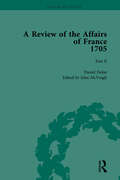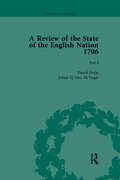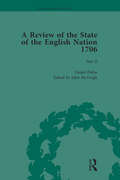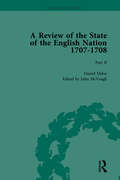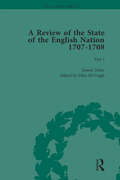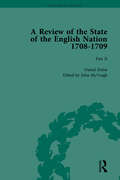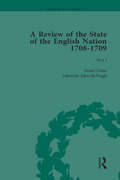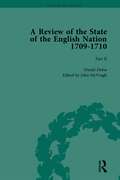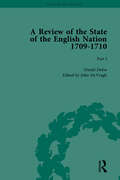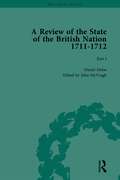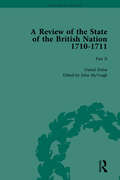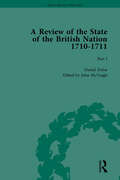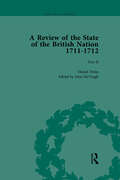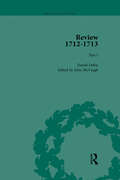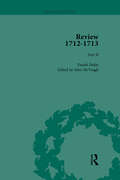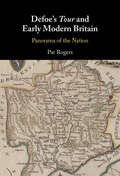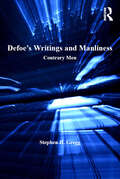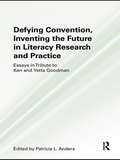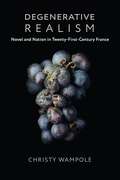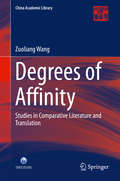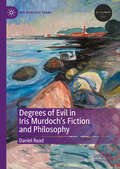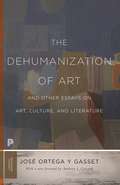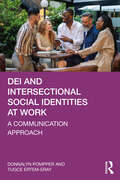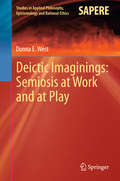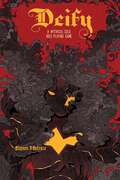- Table View
- List View
Defoe's Review 1704-13, Volume 2 (Defoe's Review 1704–13)
by John McVeaghDefoe's Review is one of the earliest examples of the political periodical which became popular in the 18th century, publishing a regular political essay and discussion on current affairs. This volume on France runs from February to December 1705 in 127 parts.
Defoe's Review 1704-13, Volume 3 (Defoe's Review 1704–13)
by John McVeaghOne of Daniel Defoe's greatest achievements was the writing and publication of his "Review". Covering his many interests, both contemporary and historical, Defoe published his journal twice and latterly three times a week. This volume reproduces the "Review" from the year 1704.
Defoe's Review 1704-13, Volume 3 (Defoe's Review 1704–13)
by John McVeaghOne of Daniel Defoe's greatest achievements was the writing and publication of his "Review". Covering his many interests, both contemporary and historical, Defoe published his journal twice and latterly three times a week. This volume reproduces the "Review" from the year 1704.
Defoe's Review 1704-13, Volume 4 (Defoe's Review 1704–13)
by John McVeaghCovering Daniel Defoe's many interests, both literary and historical, this edition is the fourth volume in "Pickering and Chatto's" 18-volume series.
Defoe's Review 1704-13, Volume 4 (Defoe's Review 1704–13)
by John McVeaghCovering Daniel Defoe's many interests, both literary and historical, this edition is the fourth volume in "Pickering and Chatto's" 18-volume series.
Defoe's Review 1704-13, Volume 5 (Defoe's Review 1704–13)
by John McVeaghDiscusses one of Daniel Defoe's greatest, but least known works, his periodical the "Review of the State of the British Nation". Defoe's Review played a significant role in the birth of the modern press. It was not a newspaper dealing in facts but a journal of opinion and discussion.
Defoe's Review 1704-13, Volume 5 (Defoe's Review 1704–13)
by John McVeaghDiscusses one of Daniel Defoe's greatest, but least known works, his periodical the "Review of the State of the British Nation". Defoe's Review played a significant role in the birth of the modern press. It was not a newspaper dealing in facts but a journal of opinion and discussion.
Defoe's Review 1704-13, Volume 6 (Defoe's Review 1704–13)
by John McVeagh"Defoe's Review" tapped into a new cultural community, helping to create the climate for Steele and Addison to develop the "Tatler" and "Spectator" in later years. This volume is suitable for scholars researching the history and literature of the eighteenth century, as well as the history of print and the book.
Defoe's Review 1704-13, Volume 6 (Defoe's Review 1704–13)
by John McVeagh"Defoe's Review" tapped into a new cultural community, helping to create the climate for Steele and Addison to develop the "Tatler" and "Spectator" in later years. This volume is suitable for scholars researching the history and literature of the eighteenth century, as well as the history of print and the book.
Defoe's Review 1704-13, Volume 8 (Defoe's Review 1704–13)
by John McVeaghDefoe's Review played a significant role in the birth of the modern press. It was not a newspaper dealing in facts but a journal of opinion and discussion. This series is the first complete scholarly edition of the entire run of Defoe's Review. It is fully reset and supported by full editorial apparatus.
Defoe's Review 1704�13, Volume 7 (Defoe's Review 1704–13)
by John McVeaghDefoe's Review played a significant role in the birth of the modern press. It was not a newspaper dealing in facts but a journal of opinion and discussion. This series is the first complete scholarly edition of the entire run of Defoe's Review. It is fully reset and supported by full editorial apparatus.
Defoe's Review 1704�13, Volume 7 (Defoe's Review 1704–13)
by John McVeaghDefoe's Review played a significant role in the birth of the modern press. It was not a newspaper dealing in facts but a journal of opinion and discussion. This series is the first complete scholarly edition of the entire run of Defoe's Review. It is fully reset and supported by full editorial apparatus.
Defoe's Review 1704�13, Volume 8 (Defoe's Review 1704–13)
by John McVeaghDefoe's Review played a significant role in the birth of the modern press. It was not a newspaper dealing in facts but a journal of opinion and discussion. This series is the first complete scholarly edition of the entire run of Defoe's Review. It is fully reset and supported by full editorial apparatus.
Defoe's Review 1704�13, Volume 9 (Defoe's Review 1704–13)
by John McVeaghDefoe's Review played a significant role in the birth of the modern press. It was not a newspaper dealing in facts but a journal of opinion and discussion. This series is the first complete scholarly edition of the entire run of Defoe's Review. It is fully reset and supported by full editorial apparatus.
Defoe's Review 1704–13, Volume 9 (Defoe's Review 1704–13)
by John McVeaghDefoe's Review played a significant role in the birth of the modern press. It was not a newspaper dealing in facts but a journal of opinion and discussion. This series is the first complete scholarly edition of the entire run of Defoe's Review. It is fully reset and supported by full editorial apparatus.
Defoe's Tour and Early Modern Britain: Panorama of the Nation
by Pat RogersAuthoritative yet accessible, this is the first-ever comprehensive account of a true landmark in eighteenth-century travel writing. Daniel Defoe's Tour thro' the Whole Island of Great Britain is constantly cited even now by students in practically every branch of history, and there are few topics essential to our understanding of the nation in the early modern period that do not show up in its pages. Historians since the late nineteenth century have looked to the Tour as one of the richest and most insightful works describing Britain in the lead-up to the Industrial Revolution, and critics and biographers of Defoe have regularly named it as among his most characteristic and central works. Indispensable for virtually any interdisciplinary approach to the nation in this period, this new study provides wide-reaching, up-to-date analysis of the content of the Tour, and of its methods, sources, form, and vast historical significance.
Defoe’s Writings and Manliness: Contrary Men
by Stephen H. GreggDefoe's Writings and Manliness is a timely intervention in Defoe studies and in the study of masculinity in eighteenth-century literature more generally. Arguing that Defoe's writings insistently returned to the issues of manliness and its contrary, effeminacy, this book reveals how he drew upon a complex and diverse range of discourses through which masculinity was discussed in the period. It is for this reason that this book crosses over and moves between modern paradigms for the analysis of eighteenth-century masculinity to assess Defoe's men. A combination of Defoe's clarity of vision, a spirit of contrariness and a streak of moral didacticism resulted in an idiosyncratic and restless testing of the forces surrounding his period's ideas of manliness. Defoe's men are men, but they are never unproblematically so: they display a contrariness which indicates that a failure of manliness is never very far away.
Defying Convention, Inventing the Future in Literary Research and Practice
by Patricia L. AndersKen and Yetta Goodman are renowned and revered worldwide for their pioneering, influential work in the field of reading/literacy education. In this volume major literacy scholars from around the world pay tribute to their work and offer glimpses of what the future of literacy research and practice might be. The book is structured around several themes related to research, practice, and theories of reading and literacy processes that characterize the Goodmans’ scholarship. Each chapter reveals how the author’s scholarship connects to one or both of the Goodmans’ work and projects that connection to the future – what are the implications for future research, theory, practice, and/or assessment? This milestone volume marking the hugely significant work of the Goodmans will be welcomed across the field of literacy education.
Degenerative Realism: Novel and Nation in Twenty-First-Century France (Literature Now)
by Christy WampoleA new strain of realism has emerged in France. The novels that embody it represent diverse fears—immigration and demographic change, radical Islam, feminism, new technologies, globalization, American capitalism, and the European Union—but these books, often best-sellers, share crucial affinities. In their dystopian visions, the collapse of France, Europe, and Western civilization is portrayed as all but certain and the literary mode of realism begins to break down. Above all, they depict a degenerative force whose effects on the nation and on reality itself can be felt.Examining key novels by Michel Houellebecq, Frédéric Beigbeder, Aurélien Bellanger, Yann Moix, and other French writers, Christy Wampole identifies and critiques this emergent tendency toward “degenerative realism.” She considers the ways these writers draw on social science, the New Journalism of the 1960s, political pamphlets, reportage, and social media to construct an atmosphere of disintegration and decline. Wampole maps how degenerative realist novels explore a world contaminated by conspiracy theories, mysticism, and misinformation, responding to the internet age’s confusion between fact and fiction with a lament for the loss of the real and an unrelenting emphasis on the role of the media in crafting reality. In a time of widespread populist anxieties over the perceived decline of the French nation, this book diagnoses the literary symptoms of today’s reactionary revival.
Degrees of Affinity
by Zuoliang WangThis book combines two collections of essays written by the late professor Zuoliang Wang, works that explore the affinity between literatures and peoples, with special attention given to that between Chinese literature and western literature in the 20th century, and which underscore the role of translation therein. Both collections have been previously published in book form: Degrees of Affinity--Studies in Comparative Literature (1985) and A Sense of Beginning--Studies in Literature and Translation (1991). As a prominent literary critic, literary historian, translator and 20th-century Chinese poet, Wang has played a unique part in English education in China. His research interests range widely, from English literature through comparative literature to translation and cultural studies, fields in which he has made outstanding accomplishments. Wang pioneered the concept of "affinity" in talking about interactions between literatures and peoples, which has since won great acclaim from both critics and common readers at home and abroad. As he points out, "momentous changes often occur when a foreign literature satisfies a sore need of an indigenous literature, thus developing a strong affinity. . . " And translation can fulfill a crucial role in bringing about affinity between literatures and peoples. According to Professor Wang, "Nothing is more crucial in cultural contacts, not to say cultural interactions, than translation, particularly in a country that for long periods closed its doors to the outside world, like China. "
Degrees of Evil in Iris Murdoch's Fiction and Philosophy (Iris Murdoch Today)
by Daniel ReadThis is the first survey of Murdoch’s exploration of evil, addressing aesthetic, philosophical, political and theological perspectives. The study demonstrates how her work engages with currently urgent issues of trauma, terrorism and psychopathy and brings her works into dialogue with key figures in twentieth- and twenty-first-century discussions of evil, including Hannah Arendt, Carl Gustav Jung, Susan Neiman and Simone Weil. These resonances are traced through close readings of Murdoch’s published fiction and philosophy in combination with unpublished texts, including annotations, interviews and letters. Murdoch’s detailed and nuanced portrayal of evil invites readers to explore the complexities of human behaviour and the potential for moral failure.
The Dehumanization of Art and Other Essays on Art, Culture, and Literature
by José Ortega y GassetA classic work on radical aesthetics by one of the great philosophers of the early twentieth century No work of philosopher and essayist José Ortega y Gasset has been more frequently cited, admired, or criticized than his response to modernism, “The Dehumanization of Art.” The essay, originally published in Spanish in 1925, grappled with the newness of nonrepresentational art and sought to make it more understandable to the public. Many embraced the essay as a manifesto extolling the virtues of vanguard artists and promoting efforts to abandon the realism and the romanticism of the nineteenth century. Others took it as a denunciation of everything that was radical about the avant-garde. This Princeton Classics edition makes this essential work, along with four of Ortega’s other critical essays, available in English. A new foreword by Anthony J. Cascardi considers how Ortega’s philosophy remains relevant and significant in the twenty-first century.
DEI and Intersectional Social Identities at Work: A Communication Approach
by Donnalyn Pompper Tugce Ertem-ErayThis book equips readers—both students and communication practitioners—with the theoretical understanding and practical skills they need to support nonprofit and for-profit organizations to create and assess their diversity, equity, inclusion (DEI), and social identity intersectionality goals.Through applied examples of the insider activist role that the communication function plays, the book helps future and current professional communicators navigate organizations toward authentic relationship-building with internal and external audiences. It teaches that embracing DEI includes acknowledging social identity intersectionalities—recognizing that people possess multiple social identity dimensions of age, culture, ethnicity/race, faith/spirituality, gender, physical/psychological ability, sexual orientation, social class, and more. In order to illuminate the theory discussed in the book, each chapter includes thought-provoking situation-opportunity sidebars, discussion questions for drilling deeper into the issues at hand, and case studies with applied lessons about DEI issues.This is an ideal text for advanced undergraduates and graduate courses in organizational communication, strategic communication, marketing communication, human resources, and public relations, as well as for communication practitioners working in these subdisciplines.
Deictic Imaginings: Semiosis at Work and at Play
by Donna E. WestThis work represents the first integrated account of how deixis operates to facilitate points of view, providing the raw material for reconciling index and object. The book offers a fresh, applied philosophical approach using original empirical evidence to show that deictic demonstratives hasten the recognition of core representational constructs. It presents a case where the comprehension of shifting points of view by means of deixis is paramount to a theory of mind and to a worldview that incorporates human components of discovering and extending spatial knowledge. The book supports Peirce's triadic sign theory as a more adequate explanatory account compared with those of Bühler and Piaget. Peirce's unitary approach underscores the artificiality of constructing a worldview driven by logical reasoning alone; it highlights the importance of self-regulation and the appreciation of otherness within a sociocultural milieu. Integral to this semiotic perspective is imagination as a primary tool for situating the self in constructed realities, thus infusing reality with new possibilities. Imagination is likewise necessary to establish postures of mind for the self and others. Within these imaginative scenarios (consisting of overt, and then covert self dialogue) children construct their own worldviews, through linguistic role-taking, as they legitimize conflicting viewpoints within imagined spatial frameworks.
Deify: A Mythical Solo Role-Playing Game
by Allyson D'AntonioDiscover Deify, a captivating creative writing RPG based on mythology from around the world. Create your own deity, molding new gods and their fate from inception to demise. Manage divine resources like domains, epithets, and mortal champions, and navigate written prompts with a tarot deck (not included). Stunning art from illustrator Maia Trewartha will inspire you to visualize unique deities born from gameplay rules, and beautifully designed player sheets and notebook pages will help you capture your journey. As your story unfolds, embrace the enigmatic world beyond worship—will you be merciful or vengeful, benevolent or cruel? The choice is yours, shaped by the cards' will. Dive into Deify for an immersive experience unlike any other! A magnificently illustrated hardcover with gold foil details.
